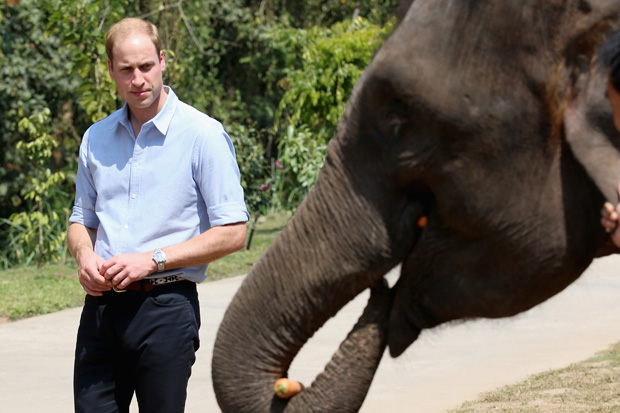Every threatened species of wildlife can count on the friendship of a member of the British royal family. There are few causes that royals can espouse without risking political controversy, but wildlife conservation is seen as one. This may be why they are ready to speak out for any newt, butterfly, or other creature facing the risk of extinction. Prominent among them is Prince William, Duke of Cambridge, who is an active campaigner for the greatest of them all, the African elephant, and last week made a strong appeal for a total ban by Britain on trade in ivory. As Cites (the 180-nation Convention on International Trade in Endangered Species) prepared to meet this week in Johannesburg, the prince said in a speech in London: ‘We have the opportunity to end, once and for all, the mixed messages we have sent for too long about the value and desirability of wildlife products…. Now is the chance to send an unambiguous message to the world that it is no longer acceptable to buy and sell ivory, rhino horn or other illegal wildlife products.’
That might sound uncontroversial when African elephants are dying in unprecedented numbers, killed by ivory poachers at a rate of one every 15 minutes, but it isn’t completely so. On the one hand, it strikes against the insistence of some southern African countries with still healthy elephant populations that they need tusk sales to finance their war against poachers. Also, by appearing to demand an end to trade in any kind of ivory artefacts, however old, the prince is seen as criticising the British government’s plan to allow trading to continue in ivory antiques made before 1947. I can’t imagine what is so special about 1947, but I support the view of the environment secretary Andrea Leadsom, my MP in South Northamptonshire, that it would be ridiculous to ban the sale of ivory objects that have been created by the ancient Greeks and Romans. Even to follow the example of the United States and ban sales of ivory less than 100 years old, as Lord Hague, the former foreign secretary, has urged on Mrs Leadsom, would seem to me to be a step much too far.
It was in 1989 that the American government introduced a law forbidding the importation of African elephant ivory, new or old, worked or unworked, into the United States, unless the article in question was more than 100 years old. The measure was criticised in the New York Times as a panicky response to alarmist propaganda by the wildlife charities, for it was enacted in defiance of some of the best expert opinion in the conservation field and at a time when elephant populations in Africa were stable. Four years later, when I was living in New York, I came across one of the more absurd consequences of this law.
I was introduced to a concert pianist called Ophra Yerushalmi who was a great fan of Franz Liszt. Liszt’s favourite piano had been an instrument from the once great Parisian house of Érard, and she was eager to own one. While Mrs Yerushalmi was in Paris, she was fortunate to find for sale a beautiful, sweet-toned rosewood grand, built by Érard in 1920 when the company was at the height of its glory. She bought if for $6,000, a bargain price, and for the same sum had it transported to New York by plane. But, because it was less than 100 years old and had keys coated with ivory, it was refused customs clearance by the Fish and Wildlife Service unless all the ivory was first stripped from it. Otherwise, the piano would have to be sent back to France.
So Mrs Yerushalmi went to the Air France warehouse at JFK airport to witness this desecration, in which steam irons were used to unglue the ivory from each key; but first she gave a final impromptu Chopin concert to an applauding audience of warehousemen. The piano was then taken to her apartment on the Upper West Side, where it languished, unplayed and unplayable, a useless, mutilated object. ‘What was done to that piano is what they don’t want to do to elephants,’ she commented. Now every piano made in or imported into the US has to have plastic-coated keys, which are more difficult to play, and there is no longer any second-hard ivory available for use in the repair or restoration of old pianos.
African elephants may be in crisis, having fallen in number by 110,000 in just ten years, and Prince William may even be right to fear that they will be extinct in the wild by the time his daughter, Charlotte, is 25 years old, but it escapes me how stripping ivory from old piano keys is going to help them.
The post Long life appeared first on The Spectator.
Got something to add? Join the discussion and comment below.
Get 10 issues for just $10
Subscribe to The Spectator Australia today for the next 10 magazine issues, plus full online access, for just $10.
You might disagree with half of it, but you’ll enjoy reading all of it. Try your first month for free, then just $2 a week for the remainder of your first year.













Comments
Don't miss out
Join the conversation with other Spectator Australia readers. Subscribe to leave a comment.
SUBSCRIBEAlready a subscriber? Log in